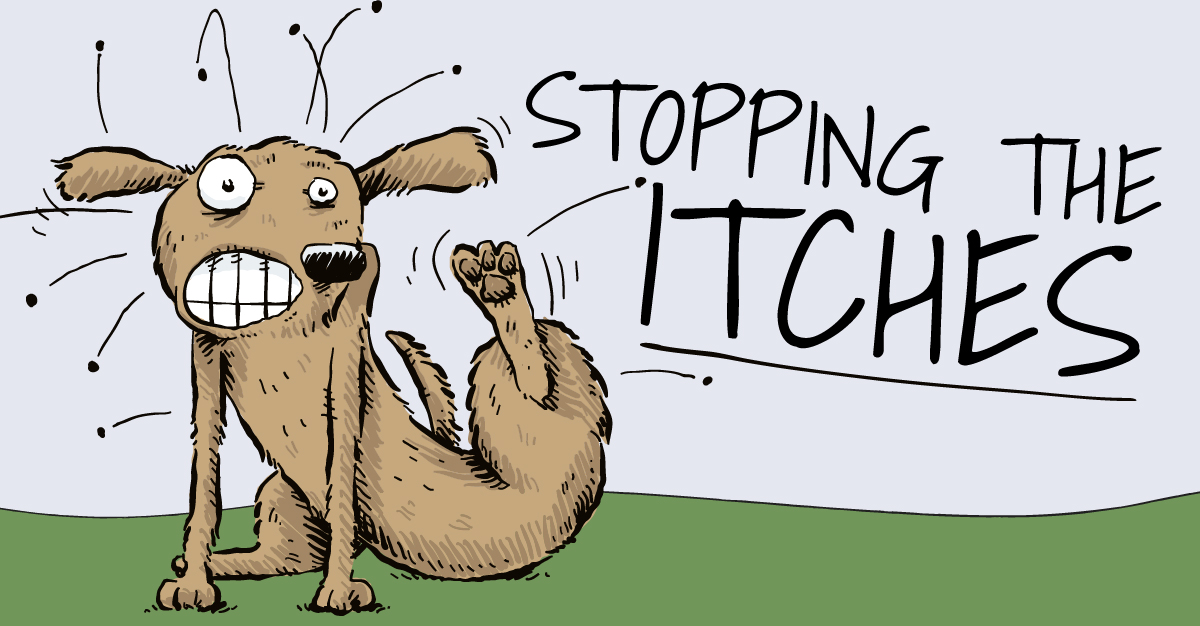Why is my dog so itchy?

Itchiness is one of the most common complaints noted by dog owners; considering the skin is the largest organ in the body it perhaps should come as no surprise, digestive issues being the number one.
It’s quite normal for dogs to have a good scratch occasionally however when this develops into licking, biting, chewing to the point of fur flying and creating wounds it’s time to consider the causes and treat it as a symptom- it can really impact on health due to the intense discomfort felt by your pet.
Itchiness can have a large number of reasons, but we will stick for now with the most common reasons why your dog might be itching and scratching and at times chewing his/her paws.
1. SKIN CONDITION
Does your dog have dandruff or is the skin flakey? Dry skin can cause a dog to feel very uncomfortable. Hormones, stress and weather all can have a real impact on skin condition.
The best thing to do is to feed a species appropriate diet with suitable fat and oils in it (Nutriment Formulas) if you are feeding a fresh and raw diet already but without supplements then consider adding Coconut Oil – do note you only need a little.
If you are not currently feeding a species appropriate diet it is highly likely that this is what is making your dog itch, processed and starchy diets often are the cause of yeast infections and itchy skin.
Also regular oily fish and the occasional egg will all help dry coats.
It is also worthy to note that dogs who are groomed and bathed a lot can suffer more from dry skin; make sure your groomer uses a lower heat when drying your dog and when you bathe your dog use
shampoos which are made specifically to be gentle on the skin and restores the skins natural oils and finish off with a conditioner.
2. PARASITES

Often we assume we would be able to see them, however, it can be hard to spot parasites, in particular, the nasty
harvest mites. So really check thoroughly and make sure you can or have eliminated parasites.
If you feel your cat or dog may be suffering from fleas or you have seen one jump up onto your arm, have a look under the upper part of the legs. If your pet has fleas, this is a likely place to find them.
You may not see a flea but also look for small black specks (flea pooh) on the skin. If you suspect fleas, it’s time for the bath. Long and thickly coated pets may need two washes a couple of days apart.
Be sure to wash all bedding and tumble dry it if you can – and give the house a good vacuum. In most mild cases where the infestation has not been long, this should be sufficient.
If this still doesn’t help and you are speaking to your vet about a treatment make sure you are informed as chemical treatments do not come without risk. [ Read more…. ]
3. ALLERGIES
Itchiness can be the symptom of an allergy to food or other environmental factors such as pollen or grass. What we suggest with food allergies initially is to start with an elimination diet.
Elimination Diet
You will need to be able to keep a diary noting what you have fed and any responses by your pet to it – this way you would be able to find out what food is triggering the itchiness.
We suggest to initially avoid chicken but to start on Turkey, which is well tolerated for 2 weeks with no other meat proteins – bear in mind that you need to do the same for any treats.
After week 2, use week 3 to introduce over a number of days Lamb then week 4 & 5 being on Lamb, then following with Duck, Salmon etc. See how you go, if you are not seeing any improvements then ring one of our qualified nutritionists on 01276 63554.
Remember with an elimination diet to avoid other proteins or novel treats.
Interestingly enough after giving advice to so many costumers we have noticed a few “trends”; staffies, frenchies, white boxers, english bull terriers, westies, yorkies, we know are prone to skin issues however once chicken was removed from the diet, most, if not all skin issues cleared up. Whilst not scientific do consider it if you are currently struggling with one of these breeds.
4. PAIN
Dogs in pain often can get very scratchy and if your dog starts chewing and biting themselves at the back sides or paws and this is a very sudden development it’s important you
visit the vet.
Other much less common reasons are neurological, behavioural and hormone related.




